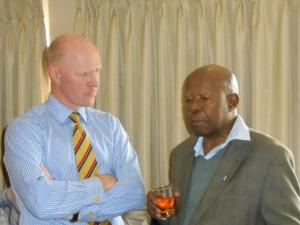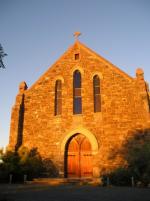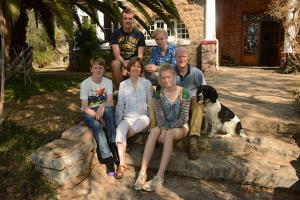Tiger Kloof – the school that would not die
 After 18 years at one of Britain’s top boarding schools, where every facility was state of the art and where we and the students wanted for nothing, I am now in a very different world. Last July I took over as Headmaster of Tiger Kloof school, in the arid North West province of South Africa, just outside the remote town of Vryburg. That requires an explanation.
After 18 years at one of Britain’s top boarding schools, where every facility was state of the art and where we and the students wanted for nothing, I am now in a very different world. Last July I took over as Headmaster of Tiger Kloof school, in the arid North West province of South Africa, just outside the remote town of Vryburg. That requires an explanation.
Tiger Kloof is not an ordinary school. It was founded in 1904 by the London Missionary Society to educate the children of the top Batswana, the ethnic group that makes up much of the north of South Africa and the whole of Botswana. It gained a reputation as the best school of its kind and produced some great leaders. The first president of Botswana, Sir Seretse Khama, was here before the Second World War, as was his successor as president, Sir Quett Masire. When Botswana gained its independence in 1965 the whole of its first cabinet was made up of ex-Tiger Kloof students and for its first 33 years as a nation an old Tiger was president. Old girl Dr. Ruth Mompati, Nelson Mandela’s secretary and leader of the ANC women in exile, still sits on the Board.
 In 1953 the apartheid government passed the Bantu Education Act, forbidding any school from teaching academic subjects to black children. The missionaries refused to compromise and withdrew in 1955. The school limped on until 1962, when it closed down. The land was declared ‘whites only’ and the 1200 hectares that belonged to Tiger Kloof was sold to a white farmer. President Verwoerd, despising what the school represented, asked for it to be destroyed, but the farmer who got the contract could not bring himself to destroy the beautiful buildings, which instead sat neglected for 30 years by the side of the road to Kimberley.
In 1953 the apartheid government passed the Bantu Education Act, forbidding any school from teaching academic subjects to black children. The missionaries refused to compromise and withdrew in 1955. The school limped on until 1962, when it closed down. The land was declared ‘whites only’ and the 1200 hectares that belonged to Tiger Kloof was sold to a white farmer. President Verwoerd, despising what the school represented, asked for it to be destroyed, but the farmer who got the contract could not bring himself to destroy the beautiful buildings, which instead sat neglected for 30 years by the side of the road to Kimberley.
After the release of Nelson Mandela a group of old students and local businessmen got together and reopened the school. In 1995 it was rededicated by Archbishop Desmond Tutu, whose mother had been a pupil at Tiger Kloof.
Now the school caters for 670 students, aged 3-18, including 180 boarders in the senior school. They do not come from the elite of Botswana – although we do have a few from Gaborone – but it educates mainly the children from the local townships, many of whom come on large bursaries. The township up the road has been without water for three weeks as I write. Many of our children have experienced drugs, abuse and violence, many are orphans or are raised by extended family. You don’t ask questions but AIDS has taken a heavy toll. Part of the legacy of apartheid has been a destruction of family life.
 In the midst of this Tiger Kloof is flourishing. Apart from getting a decent education – the final exam pass rate is usually 100% - the school stands firmly on the foundations laid by those early missionaries. As you arrive at the gates you will be greeted by a plaque which reads ‘No one can lay any other foundation than that already laid, which is Jesus Christ.’ And a short stay at the school will tell you that this is not mere rhetoric. It is both a statement and an aspiration and it is a faith that works itself out in action. We support four soup kitchens, which are visited regularly and the spirit of service displayed by many of the students is remarkable, even from those who themselves have very little.
In the midst of this Tiger Kloof is flourishing. Apart from getting a decent education – the final exam pass rate is usually 100% - the school stands firmly on the foundations laid by those early missionaries. As you arrive at the gates you will be greeted by a plaque which reads ‘No one can lay any other foundation than that already laid, which is Jesus Christ.’ And a short stay at the school will tell you that this is not mere rhetoric. It is both a statement and an aspiration and it is a faith that works itself out in action. We support four soup kitchens, which are visited regularly and the spirit of service displayed by many of the students is remarkable, even from those who themselves have very little.
South Africa’s education system is rated in many criteria as the worst in the world. 28% of schoolgirls here are HIV positive and less than a third of children live with both their parents. But Tiger Kloof is seeking to do again what it did once before, to produce the leaders of the next generation, leaders who will lead their communities while holding firmly to the values that they have learned at Tiger Kloof.
Back in September we had a reception in Gaborone for old Tigers and ex-president Sir Quett Masire took the microphone. He said that his generation at Tiger Kloof always held onto what they were taught by the missionaries. Botswana now is one of the most stable and successful countries in post-colonial Africa. ‘One day,’ he said, ‘Botswana will build a memorial to Tiger Kloof.’
That is the vision for the future. At the beginning of this year I told the staff that Tiger Kloof should be like the mustard tree in the parable of Jesus. It starts small but grows to be the largest garden plant and all sorts of animals come and refresh themselves in its shade and branches.
Tiger Kloof: Building On Solid Ground from Karen Elliott Greisdorf on Vimeo.
Mark Boobbyer is Headmaster of Tiger Kloof school, South Africa, and has had a long association with Initiatives of Change.
NOTE: Individuals of many cultures, nationalities, religions, and beliefs are actively involved with Initiatives of Change. These commentaries represent the views of the writer and not necessarily those of Initiatives of Change as a whole.


